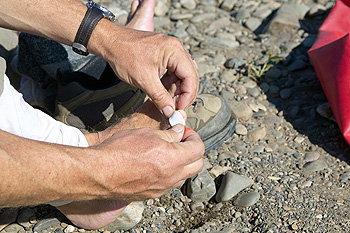
Blisters between the toes can be both painful and frustrating. Blisters between the toes often develop due to friction, moisture, or improperly fitting footwear. Friction, the repeated rubbing of toes against each other or the interior of your shoes, is a common culprit. When sweat and moisture become trapped between the toes, it creates an ideal environment for blisters to form. Wearing ill fitting shoes, whether they are too tight or too loose, can exacerbate the problem. Additionally, certain skin conditions such as athlete's foot can render the skin more susceptible to blistering. To address blisters between the toes, it is important to maintain proper foot hygiene and cover the affected area with a bandage. Avoid the temptation to pop blisters, as doing so can lead to infections. Embrace moisture-wicking socks, including toe socks that resemble gloves for the feet. Wearing these may help to reduce moisture between the toes. Ensure your footwear offers an appropriate fit and explore the use of toe protectors or blister pads to reduce friction. If the blisters persist or show signs of infection, it is suggested that you make an appointment with a podiatrist who can safely deal with any problem they have caused.
Blisters are prone to making everyday activities extremely uncomfortable. If your feet are hurting, contact one of our podiatrists of North Penn Podiatry. Our doctors can provide the care you need to keep you pain-free and on your feet.
Foot Blisters
Foot blisters develop as a result of constantly wearing tight or ill-fitting footwear. This happens due to the constant rubbing from the shoe, which can often lead to pain.
What Are Foot Blisters?
A foot blister is a small fluid-filled pocket that forms on the upper-most layer of the skin. Blisters are filled with clear fluid and can lead to blood drainage or pus if the area becomes infected.
How Do Blisters Form?
Blisters on the feet are often the result of constant friction of skin and material, usually by shoe rubbing. Walking in sandals, boots, or shoes that don’t fit properly for long periods of time can result in a blister. Having consistent foot moisture and humidity can easily lead to blister formation.
Prevention & Treatment
It is important to properly care for the affected area in order to prevent infection and ease the pain. Do not lance the blister and use a Band-Aid to provide pain relief. Also, be sure to keep your feet dry and wear proper fitting shoes. If you see blood or pus in a blister, seek assistance from a podiatrist.
If you have any questions, please feel free to contact our offices located in Lansdale, and King of Prussia, PA . We offer the newest diagnostic and treatment technologies for all your foot care needs.
